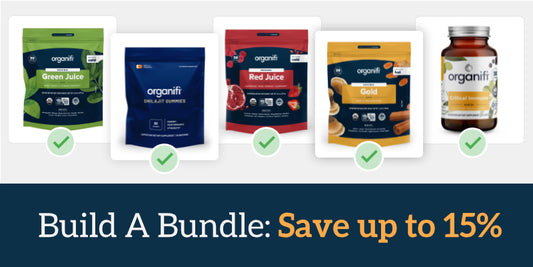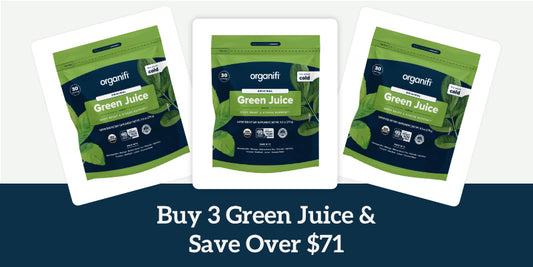Breakfast burritos are awesome. Burrito-babies? Not so much. Probiotics for bloating could be the solution you’re looking for to finally break free from belly-bloat, gas, and the discomfort that can make even the most delicious meal a dreadful one.
But whether that gas and bloating is the result of overeating or something else, this problem is more common than you might think:
Approximately two-thirds of Americans experience one or more gastrointestinal issues, out of which over 20% report “bloating” to be the top one. Closely followed by flatulence, diarrhea, and constipation (the last two which could be due to IBS or otherwise).
Talk about uncomfortable!
Abdominal distension - aka bloating- is a natural process that occurs following digestion. But when it’s persistent, located in the lower belly and/or accompanied by gas, it could be a sign of something more severe.
In many cases, a disrupted or unhealthy gut environment may be behind the distension. If you’re tired of getting a “food baby” or gas after every meal, this guide on the best probiotic for bloating may help you find a solution to feel better.
Probiotics, Digestion, and Belly Bloat
There are trillions of microorganisms lining the gut, with over 500 species of bacteria, yeast, and fungi that support multiple bodily functions when balanced.
A poor diet, lack of exercise, environmental toxins, infections, and antibiotics can all disrupt the delicate equilibrium of the gut microbiome, resulting in bloat.
Probiotics for bloating may restore that balance, but you may need to try a few different things or wait a few weeks for the probiotics to replenish the stores of healthy bacteria in your gut.
Why? Because probiotics are bacteria and types of yeast that already populate the human gastrointestinal tract. They have a positive effect on the body by supporting digestion, the immune system, brain, nutrient absorption, and waste elimination. They also do a great job of keeping other “unfriendly” bacteria and yeast in check.
You can find probiotics naturally in whole foods, fortified health foods, and more commonly in specially designed supplements that host billions of these live culture bacteria, selected for their health benefits.
Why do we bloat?
When you eat, the stomach expands to break down food into nutrients required by the body to function.
Normally, this should happen fairly quickly and it shouldn’t feel uncomfortable or painful. You should feel great after eating and have more energy. However, sometimes, we may eat something that is new to our body, something we may have a slight allergy to, or just simply too much of something.
In other words, it’s ok to feel your digestion after an over-indulgent Thanksgiving weekend or a dinner party with friends. But it’s not normal to experience this every day and for hours on end. If that’s the case, then it’s time to pay attention.
Some common causes of bloat:
- Excess salt, sugar, or high-fat foods
- Food allergies or food sensitivity
- Too much soda or carbonated drinks
- Constipation
- Irritable Bowel Syndrome (IBS)
- Inflammatory Bowel Disease
- Celiac disease
There are many causes for belly bloat, which is why doctors have a hard time pinning one down when patients come in with chronic bloating.
The best thing to do is to start noticing patterns and relationships between foods, drinks, bowel movements and bloating. You can keep a food diary and update how you feel before, during and after you eat (immediately after and 1 hour after). You can start eliminating those things you see constantly irritating you. And you should consult with a licensed physician if you suspect you may have IBS or another issue.
Finally, you may see bloating due to water retention or after starting a new nutrition and workout plan, but those are different and will settle after a few days.
The Best Probiotics for Bloating
Fortunately, if you want to say goodbye to gas and uncomfortably bursting bellies, researchers have tested probiotics for bloating with positive results. They may even contribute to the normal PH of stomach acids.
This recent systematic review identified over 70 qualifying studies that examined the potential benefits of probiotics supplements for multiple lower gastrointestinal issues, including bloating, gas, diarrhea, constipation, and bowel movement consistency. Probiotics for IBS were the most consistently analyzed, as IBS was one of the most frequently reported causes of bloating in patients.
Over 70% found that probiotics for bloating are highly effective when compared to placebo control groups, particularly in IBS cases.
Additional studies point to the probiotic strains in the Lactobacillus Acidophilus ( Bi-07) and Bifidobacterium Lactis (Bi-07) families to be the best probiotic for bloating, distension, and flatulence, with noticeable improvements at the four-week mark and minimizing severity at eight weeks.
The good news is that people with gastrointestinal issues may see a significant reduction in abdominal pain and inflammation in just two months after taking probiotic supplements.
It’s not instant gratification, it’s better.
That’s because probiotics are safe to take every day and can easily become a part of your daily routine.
For that particular study, participants took probiotics for bloating twice a day and found that those taking Bifidobacterium Lactis also improved bowel movement consistency and regularity - effectively reducing constipation and even more belly bloat.
But what about healthy individuals?
If you struggle with belly bloat (and with today’s crazy schedules - who doesn’t?), probiotics could still provide digestive support and help reduce abdominal distension - even if you don’t suffer from IBS or a similar condition.
Not to mention the other benefits of probiotics.
Probiotics maintain, grow or repopulate the gut microbiome with live cultures of helpful bacteria, so the probiotics for bloating listed above just might help you. In fact, probiotics are considered by the National Center for Complementary and Integrative Health (NCCIH) to be mostly “helpful and safe” as supplementary or preventative therapy.
Probiotics may only be contraindicated for people with severely depressed immune systems or medical conditions that expressly say so. Consulting with a doctor when starting a new supplement regime is still advisable, as probiotics can impact the absorption of prescription medications.
Could Probiotics Contribute to Bloating?
The short answer is: yes, they could. But it’s more complicated than that.
Probiotics for bloating are not universal, and even though they’re one of the safest ways to achieve balance in the gut, every person is different. The way you react to different strains of probiotics is also unique.
As pointed out earlier, research shows the best probiotics for bloating are in the Bifidobacterium and Lactobacillus families, but you may often find these in combination with other strains. There could be cases where people take probiotics and find that they continue to experience bloating for a while as their body adjusts. Or, they need to try a different combination that fits their specific needs better.
For example, when looking at probiotics for bloating from IBS, some people may benefit from the ones slowing down bowel movements (IBS-D.) In contrast, others may need to expedite them (IBS-C).
You can see how taking the wrong one for the wrong type of IBS may not prove helpful, right? In each case, the main probiotic families are the same, but the strain combinations are different.
Do probiotics cause gas?
Sometimes! But it should only last a few days or weeks as the body readjusts. With over 500 species of bacteria in the gut, it’s only natural that they would fight for dominance in the environment. Introducing helpful bacteria may cause a temporary reaction.
When do probiotics cause gas or bloating?
Usually, only when you first start using probiotics for bloating, as the changes in the microbiota are taking place. This is also the case when people take probiotics without reducing triggers like salty, sugary, or fatty foods from their diet.
7 Ways to Say Goodbye to Gas and Bloating:
Feeling sluggish and bloated is anything but fun. If you’re committed to feeling your best, we recommend trying a few things - in addition to probiotics for bloating.
#1 Keep a Food Journal
Notice what happens when you eat certain foods; beans, onions, broccoli, cauliflower, raw cabbage, and some bean sprouts tend to cause distension and take longer to digest. Notice other foods as well, like bell peppers and hot spices.
Keep a journal to record what you ate, when and how it made you feel. Look back at it often to start seeing patterns emerge!
#2 Eat Slowly and to Satisfaction
This may surprise you, but as you eat and chew, air bubbles enter the stomach. The faster you eat, the more air that comes with it.
Try chewing slowly, counting up to the number 32 with each bite. It feels like a lot of time - especially if you’re a naturally fast eater. But it will also help you feel fuller faster because you’ll be giving your body more time to send a satiated signal to the brain.
This could also help maintain the normal PH of stomach acids, reducing or avoiding acid reflux or heartburn.
#3 Reduce Soda, Sugar, and Fat
Fizzy and carbonated drinks also bring extra air and gas into the system.
So, to reduce gas,cut them out - or at least reduce your consumption. Do the same for low-nutrition foods like french fries, processed foods, and pastries. These tend to feed “unfriendly bacteria” and disrupt the normal PH of stomach acids.
#4 Feed Your Gut the Good Stuff
In addition to taking supplements, you can eat fiber, prebiotic foods, and foods with probiotics for bloating like kefir, yogurt, sauerkraut, and tempeh. This helps your gut grow the friendly bacteria naturally and reduce constipation.
#5 Find Your Probiotic Match
Be willing to test probiotics for bloating with patience and an open mind. Most studied cases started to see positive results after four weeks. It’s a marathon, not a race!
In the meantime, you can drink soothing teas, practice gas-relieving stretches or yoga and keep a close eye on your food journal.
Bear in mind the best probiotic for bloating combines Bifidobacterium Lactis and Lactobacillus Acidophilus. Find these 2 powerful strains in Organifi's newest prebiotic and probiotic blend, Organifi Balance.
#6 Add Movement
Exercise may stimulate digestion and improve gut transit time. This may reduce the internal causes of belly bloat. Walking, gentle jogging, or even yoga (there’s actually a wind-relieving pose) could help.
It doesn’t matter when you’re exercising during the day, but that you do a little each day.
#7 Reduce Stress
Yes! Even to fight belly bloat.
Stress has been linked to functional bloating and IBS, both as a contributing factor and consequence. When you’re stressed, the body diverts blood from all organs, including the gut, into muscles for the “fight or flight” response. Think about the knot that forms in your stomach when you’re nervous - a similar thing is happening when you are stressed. And chronic stress keeps your body and gut constantly on high alert.
That also means that an unexpected, but positive, side effect of probiotics for bloating may be an improved mood.
Do it Today!
Abdominal distension and gas is not only uncomfortable but can also be crippling at times, even affecting people’s ability to work and function properly. If you’re experiencing this often it may be time to look into it with a licensed physician.
You can advocate for your health by keeping a record of your meals and how your body felt afterward. Keep track of the probiotics for bloating you tried and make note of how your gut evolved with them. Finally, let your doctor know of any other natural approaches you took to get rid of bloating.
Probiotics for bloating may help, but you can also help your supplements work faster (or at least make their job a little easier) by making the lifestyle changes necessary to support your health.




